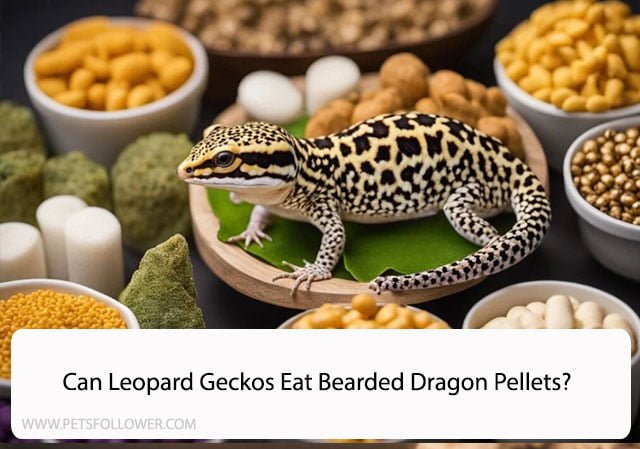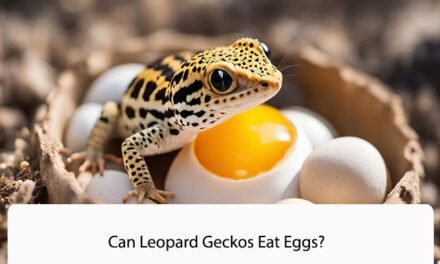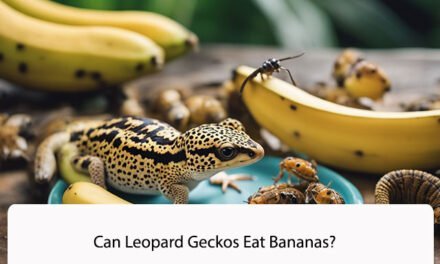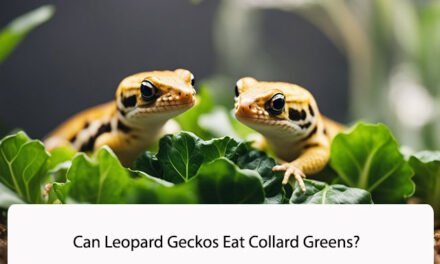Leopard geckos and bearded dragons are two of the most popular pet reptiles in the world. While they have different dietary requirements, many owners wonder if they can feed their leopard gecko bearded dragon pellets. In this article, we will answer this question and provide you with all the information you need to know about feeding your leopard gecko.
First, it’s important to understand that leopard geckos and bearded dragons have different nutritional needs. Leopard geckos are insectivores, which means their diet consists primarily of insects such as crickets, mealworms, and dubia roaches. On the other hand, bearded dragons are omnivores and require a more varied diet that includes both insects and vegetables. While bearded dragon pellets may contain some of the nutrients that leopard geckos need, they are not a suitable replacement for a diet of live insects.
Dietary Needs of Leopard Geckos
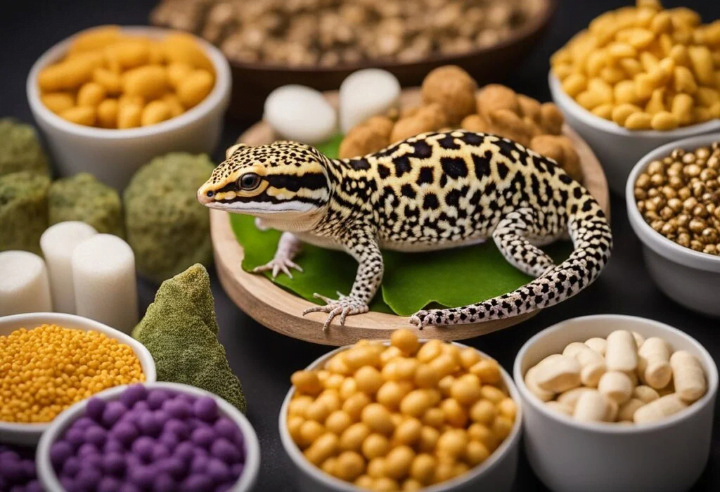
As responsible pet owners, we want to ensure that our leopard geckos are getting the proper nutrition they need to stay healthy and happy. Leopard geckos are insectivores, which means they primarily eat insects. However, they also require a balanced diet that includes vitamins and minerals to maintain their health.
Here are some key dietary needs of leopard geckos:
Protein
Protein is essential for the growth and maintenance of leopard geckos. In the wild, they primarily eat insects such as crickets, mealworms, and waxworms. As pets, we can provide them with a variety of insects to ensure they are getting a balanced diet. It’s important to avoid feeding them insects that are too large or hard to digest, as this can cause health problems.
Vitamins and Minerals
Leopard geckos require a variety of vitamins and minerals to maintain their health. Calcium is particularly important, as it helps to keep their bones strong. We can provide our geckos with calcium by dusting their food with a calcium supplement. It’s also important to ensure they are getting enough vitamin D3, which helps their bodies absorb calcium.
Water
Leopard geckos require access to clean, fresh water at all times. They may not drink water as often as other animals, but it’s still important to ensure they have access to it. We can provide water in a shallow dish that is easy for them to access.
Bearded Dragon Pellets
While bearded dragon pellets may seem like a convenient option for feeding leopard geckos, they are not an ideal choice. Leopard geckos have different dietary needs than bearded dragons, and their bodies may not be able to digest the pellets properly. It’s best to stick to a diet of live insects and calcium supplements to ensure our geckos are getting the proper nutrition they need.
Understanding Bearded Dragon Pellets
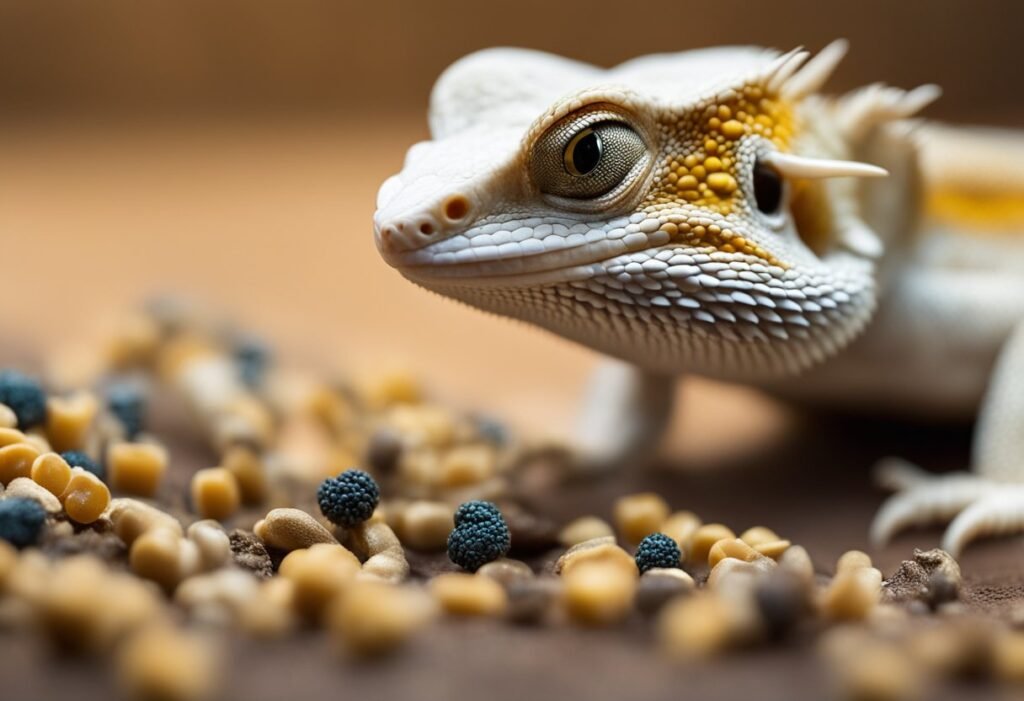
When it comes to feeding leopard geckos, it’s important to understand the nutritional value of the food. Bearded dragon pellets are a popular food for bearded dragons, but can they be fed to leopard geckos? Let’s take a closer look.
Bearded dragon pellets are typically made from a blend of vegetables, fruits, and insects. They are high in protein, fiber, and other essential nutrients that bearded dragons need to stay healthy. However, they may not be the best choice for leopard geckos.
Leopard geckos are insectivores, which means they primarily eat insects. While they may occasionally eat fruits and vegetables, their diet should consist mostly of insects. Bearded dragon pellets may not provide the right balance of nutrients for leopard geckos, as they are formulated specifically for bearded dragons.
Additionally, bearded dragon pellets may be too large for leopard geckos to eat. Leopard geckos have smaller mouths and may have difficulty swallowing larger pellets. It’s important to choose an appropriately sized food for your leopard gecko to avoid any potential health issues.
In conclusion, while bearded dragon pellets may be a nutritious food for bearded dragons, they may not be the best choice for leopard geckos. It’s important to choose a diet that is tailored to your leopard gecko’s specific needs and to choose appropriately sized food to avoid any potential health issues.
Nutritional Comparison
When it comes to feeding leopard geckos, it’s important to provide them with a balanced and nutritious diet. One question that often arises is whether or not bearded dragon pellets can be used as a staple food for leopard geckos. In this section, we will compare the nutritional content of bearded dragon pellets and the dietary requirements of leopard geckos.
Bearded dragon pellets are designed to meet the nutritional needs of bearded dragons, which have different dietary requirements than leopard geckos. While bearded dragon pellets contain some of the essential nutrients that leopard geckos need, they may not provide all of the necessary nutrients in the correct ratios.
Leopard geckos require a diet that is high in protein and low in fat. They also need a good source of calcium and vitamin D3 to maintain healthy bones and prevent metabolic bone disease. Bearded dragon pellets, on the other hand, are higher in fat and lower in protein than what leopard geckos need. They also contain a different ratio of calcium to phosphorus, which can lead to health problems if not balanced correctly.
Overall, while bearded dragon pellets can be used as an occasional treat for leopard geckos, they should not be used as a staple food. It’s important to provide leopard geckos with a diet that is specifically designed to meet their nutritional needs. A balanced diet for leopard geckos should consist of live insects such as crickets, mealworms, and dubia roaches, as well as a variety of fresh vegetables and fruits.
In conclusion, while bearded dragon pellets may contain some of the essential nutrients that leopard geckos need, they are not a suitable food source for these reptiles. It’s important to provide leopard geckos with a balanced diet that meets their specific nutritional requirements to ensure their health and well-being.
Feeding Leopard Geckos
Leopard geckos are insectivores, which means that their diet should mainly consist of insects. However, some people may wonder if they can feed their leopard geckos with bearded dragon pellets as a source of nutrition. In this section, we will discuss appropriate food items for leopard geckos, their feeding schedule, and supplement usage.
Appropriate Food Items
Leopard geckos can eat a variety of insects, including crickets, mealworms, waxworms, and superworms. It is important to provide a variety of insects to ensure that your leopard gecko is receiving a balanced diet. Additionally, it is recommended to gut-load the insects with nutritious foods such as vegetables and fruits before feeding them to your leopard gecko.
It is not recommended to feed bearded dragon pellets to leopard geckos as their primary source of nutrition. Bearded dragon pellets are formulated specifically for bearded dragons and may not contain the appropriate nutrients that leopard geckos need.
Feeding Schedule
Leopard geckos should be fed every other day, with the amount of food depending on their age and size. Baby leopard geckos should be fed more frequently than adult leopard geckos. It is important to monitor your leopard gecko’s weight and adjust their feeding schedule accordingly.
It is also important to feed leopard geckos during the evening or night as they are nocturnal animals and are more active during these times.
Supplement Usage
Supplements are important in ensuring that your leopard gecko is receiving all the necessary vitamins and minerals. Calcium and vitamin D3 supplements should be dusted onto their food at least once a week. It is also recommended to use a multivitamin supplement once a month to ensure that your leopard gecko is receiving all the necessary nutrients.
In conclusion, leopard geckos should be fed a diet consisting of a variety of insects and supplemented with calcium and multivitamins. It is not recommended to feed bearded dragon pellets to leopard geckos as their primary source of nutrition. By following these guidelines, you can ensure that your leopard gecko is receiving a balanced and nutritious diet.
Potential Risks of Mismatched Diets
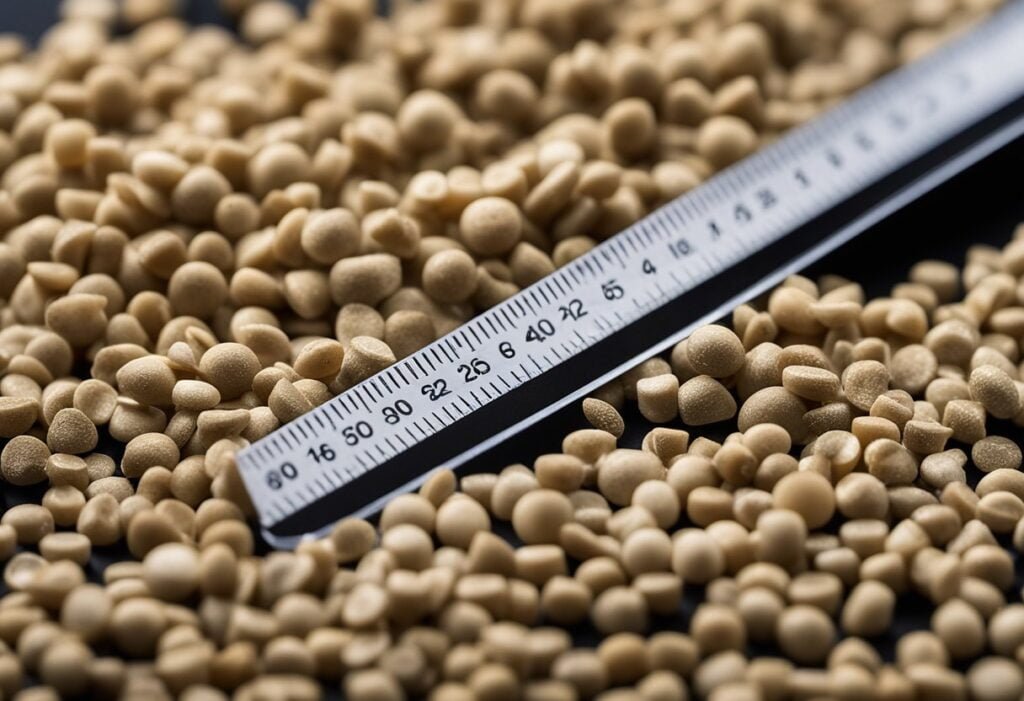
Feeding your leopard gecko bearded dragon pellets may seem like a convenient option, but it can lead to several potential risks. Here are some of the reasons why you should avoid feeding your leopard gecko with bearded dragon pellets:
- Nutritional Imbalance: Bearded dragon pellets are formulated to meet the specific nutritional needs of bearded dragons. They contain a different balance of vitamins, minerals, and nutrients than what leopard geckos require. Feeding your leopard gecko with bearded dragon pellets can result in nutritional deficiencies or imbalances, which can lead to serious health problems.
- Digestive Issues: Leopard geckos have different digestive systems than bearded dragons. Feeding your leopard gecko with bearded dragon pellets can cause digestive issues, such as constipation, bloating, and diarrhea. These problems can be uncomfortable for your pet and can lead to more serious health issues if left untreated.
- Toxicity: Bearded dragon pellets may contain ingredients that are toxic to leopard geckos. For example, some pellets contain high levels of vitamin D3, which can be toxic to leopard geckos in large amounts. Feeding your leopard gecko with bearded dragon pellets can also expose them to harmful chemicals or preservatives.
In conclusion, feeding your leopard gecko with bearded dragon pellets is not recommended. To ensure your pet’s health and wellbeing, it’s important to provide them with a diet that meets their specific nutritional needs. Consult with your veterinarian or a reptile nutrition expert to determine the best diet for your leopard gecko.
Alternative Diet Options for Leopard Geckos
As we all know, leopard geckos are insectivores, which means that they primarily eat insects. However, it is not uncommon for leopard gecko owners to try out different food options for their pets. In this section, we will discuss some of the alternative diet options for leopard geckos, including bearded dragon pellets.
Bearded Dragon Pellets
Bearded dragon pellets are a type of commercial food that is specifically formulated for bearded dragons. However, some leopard gecko owners have tried feeding their pets with these pellets. While it is not recommended to feed leopard geckos with bearded dragon pellets as their primary diet, it can be used as a supplement to their regular diet.
It is important to note that bearded dragon pellets should not be the main source of nutrition for leopard geckos. These pellets are formulated for bearded dragons, which have different nutritional requirements than leopard geckos. Thus, feeding leopard geckos with bearded dragon pellets as their primary diet can lead to nutritional deficiencies and other health problems.
Other Alternative Diet Options
Aside from bearded dragon pellets, there are other alternative diet options that leopard gecko owners can try. These include mealworms, crickets, superworms, and waxworms. These insects are readily available in pet stores and are a great source of protein for leopard geckos.
Another alternative diet option for leopard geckos is gut-loaded insects. Gut-loading is the process of feeding insects with nutrient-rich foods before feeding them to leopard geckos. This ensures that the insects are packed with nutrients that leopard geckos need.
In conclusion, while bearded dragon pellets can be used as a supplement to leopard geckos’ regular diet, it should not be their primary source of nutrition. Leopard geckos are insectivores and require a diet that is primarily composed of insects. It is important to provide them with a variety of insects and to ensure that they are getting the nutrients that they need to stay healthy.
Signs of Nutritional Deficiencies
As responsible pet owners, we must ensure that our leopard geckos are receiving a balanced and nutritious diet. While bearded dragon pellets may seem like a convenient and easy option, it is important to understand that they may not provide all the necessary nutrients required for a leopard gecko’s optimal health.
One of the most common signs of nutritional deficiencies is a lack of appetite. If your leopard gecko suddenly loses interest in food or stops eating altogether, it may be a sign that they are not receiving the necessary nutrients they need. Other signs of nutritional deficiencies include lethargy, weight loss, and stunted growth.
Another common deficiency in leopard geckos is a lack of calcium. Without adequate calcium, leopard geckos can develop metabolic bone disease, which can lead to deformities, fractures, and even death. Signs of calcium deficiency include soft or rubbery bones, tremors, and difficulty walking.
To ensure that your leopard gecko is receiving a balanced diet, it is important to provide a variety of foods, including live insects, gut-loaded insects, and vegetables. It is also important to dust their food with calcium and vitamin supplements to ensure that they are receiving all the necessary nutrients.
In conclusion, while bearded dragon pellets may be a convenient option, it is important to understand the potential risks and limitations. By monitoring your leopard gecko’s diet and ensuring that they are receiving a balanced and nutritious diet, you can help prevent nutritional deficiencies and promote their overall health and wellbeing.
Consulting with a Veterinarian
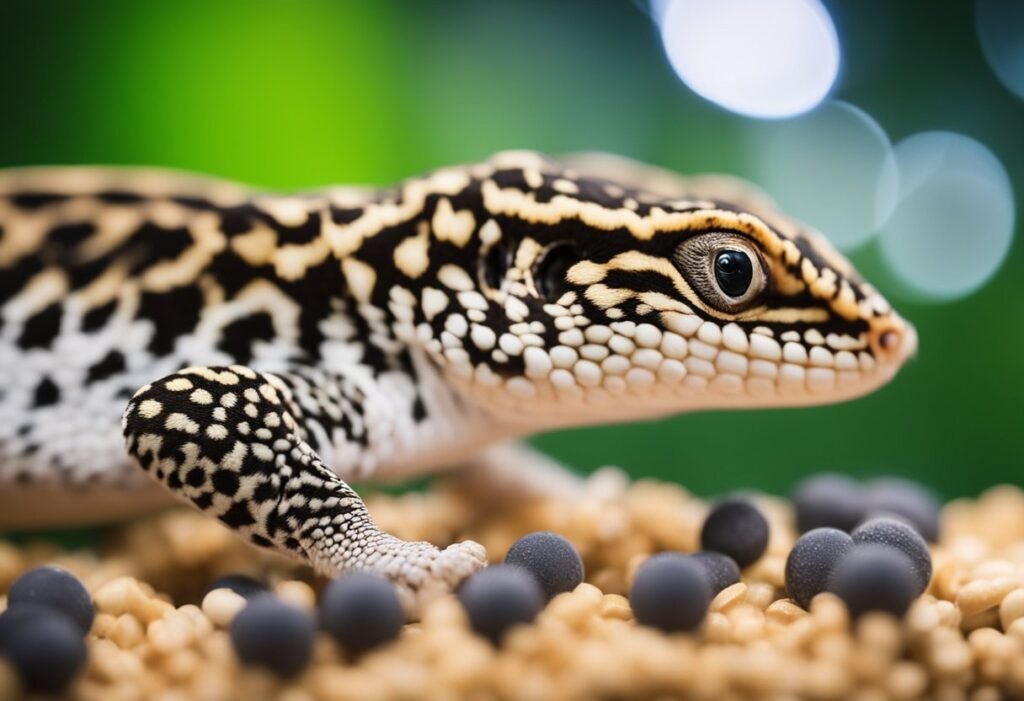
When it comes to feeding your leopard gecko, it’s always best to consult with a veterinarian before making any changes to their diet. This is especially important if you are considering feeding them bearded dragon pellets.
A veterinarian can provide valuable insight into whether or not bearded dragon pellets are a suitable food source for your leopard gecko. They can also advise you on the appropriate amount to feed your gecko and how often to feed them.
It’s important to note that while bearded dragon pellets may contain some of the necessary nutrients for leopard geckos, they may not provide a complete and balanced diet. A veterinarian can help you determine if additional supplements or foods are necessary to ensure your gecko is getting all the nutrients they need.
In addition to consulting with a veterinarian, it’s important to do your own research and ensure that any food you are feeding your leopard gecko is safe and appropriate for their species. Always read the ingredients and nutritional information on the packaging before feeding your gecko any new food.
Overall, consulting with a veterinarian is the best way to ensure that your leopard gecko is receiving a healthy and balanced diet. They can provide personalized advice and recommendations based on your gecko’s individual needs and health status.
Frequently Asked Questions
What is the ideal diet for leopard geckos?
Leopard geckos are insectivores, which means their diet should consist mainly of insects. The ideal diet for a leopard gecko includes crickets, mealworms, waxworms, and Dubia roaches. It’s important to provide a variety of insects to ensure they receive all the necessary nutrients.
Are mealworms a suitable food choice for leopard geckos?
Mealworms are a common food choice for leopard geckos, but they should not be the only food offered. Mealworms have a high fat content and can cause health problems if fed in excess. It’s recommended to offer mealworms as part of a varied diet.
What insects are safe for leopard geckos to consume?
In addition to crickets, mealworms, waxworms, and Dubia roaches, other safe insect options for leopard geckos include superworms, silkworms, and black soldier fly larvae. It’s important to avoid feeding wild-caught insects as they may carry parasites or pesticides.
Can leopard geckos have fruits and vegetables, and if so, which ones?
Leopard geckos do not require fruits and vegetables in their diet, but they can be offered as occasional treats. Safe options include small amounts of mashed banana, papaya, or pumpkin. Vegetables should be avoided as they are difficult for leopard geckos to digest.
What are the dietary risks of feeding leopard geckos bearded dragon-specific foods?
Bearded dragon pellets are not recommended for leopard geckos as they are formulated for a different species with different nutritional needs. Feeding bearded dragon-specific foods can lead to malnutrition and health problems in leopard geckos.
What should be avoided when feeding leopard geckos?
Leopard geckos should not be fed insects that are too large, as they can cause impaction. Insects should also be gut-loaded with a nutritious diet before being offered to leopard geckos. It’s important to avoid feeding insects caught in the wild, as they may carry parasites or pesticides. Additionally, leopard geckos should not be fed pinkie mice or other vertebrates as they are not part of their natural diet.

